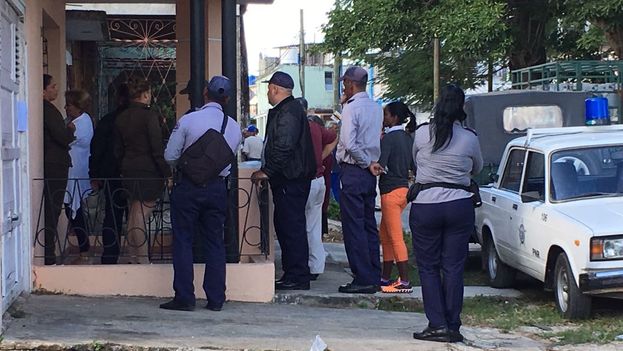
![]() 14ymedio, Havana, 6 February 2017 – A report released this Monday by the National Cuban Commission for Human Rights and National Reconciliation (CCDHRN) counts 478 arbitrary arrests against dissidents throughout the island during the month of January. The text states that during the past month, there were 20 arrests more than in December 2016.
14ymedio, Havana, 6 February 2017 – A report released this Monday by the National Cuban Commission for Human Rights and National Reconciliation (CCDHRN) counts 478 arbitrary arrests against dissidents throughout the island during the month of January. The text states that during the past month, there were 20 arrests more than in December 2016.
The independent body documents “12 cases of physical aggression and 11 cases of harassment” of opponents, a situation that is part of the “policy of intimidating repression” that “has prevailed in Cuba for nearly six decades.”
The CCDHRN affirms that the Ladies in White movement continues to be a priority target of political repression, although the Patriotic Union of Cuba (UNPACU) also is a particular target of “the arbitrary arrests and destructive raids against its members.”
UNPACU, an opposition organization with a strong presence in the east of the country, has been the victim of “plundering of their means of work (laptops , cameras, mobile phones, etc.).” These police acts have been carried out “with a great deal of political hatred,” the Commission points out.
The report conveys the concern of the CCDHRN on “the situation in prison of Dr. Eduardo Cardet, general coordinator of the Christian Liberation Movement, who has just been adopted as a prisoner of conscience by Amnesty International.”
For ordinary prisoners, “material conditions and abuse continue to worsen” in the nearly two hundred prisons and prison camps on the island
The concern extends to the “arbitrary detention for several days, of Karina Galvez,” a member of the editorial board of the magazine Coexistence, accused of the crime of tax evasion and now awaiting trial. The economist was released on bail on January 17 after six days of detention.
The Commission states that “the number of politically motivated prisoners in Cuba is still over 100, of which 55 are active members of the Patriotic Union of Cuba.” For ordinary prisoners, “material conditions and abuse continue to worsen” in the nearly two hundred prisons and prison camps on the island.
The text states that the Government “continues to use prisoners as semi-skilled labor in various jobs for commercial purposes,” including “the production of charcoal for export, mainly to Europe and the United States of America,” referring to the recent shipment of charcoal made from the invasive marabou week to the United States.
Last year the CCDHRN documented a total of 9,940 arbitrary arrests, a figure that “places the Government of Cuba in the first place in all of Latin America” with regards to arrests of this type, according to a report by the independent organization.
